What is postpartum depression, by what signs can it be recognized by yourself and others? An article on ways to treat postpartum emotional decline.
Contents
- Symptoms of postpartum depression
- Why does postpartum depression occur?
- How to recognize postpartum depression?
- How long does it usually take to have postpartum depression?
- Stages of postpartum depression
- How to get out of postpartum depression yourself?
- How to behave during prolonged postpartum depression?
- How to avoid postpartum depression?
- Will folk remedies help survive post-natal depression?
- How to get out of postpartum depression alone: advice and feedback
- Video: Postpartum depression: myth or reality?
Postpartum depression occurs in 10-15% of young mothers, and half of them have a severe form of the disease. Postpartum depression must necessarily be treated, because the prolonged disease threatens the most severe form of leakage, and in some cases - suicide or causing harm to the child.
Symptoms of postpartum depression
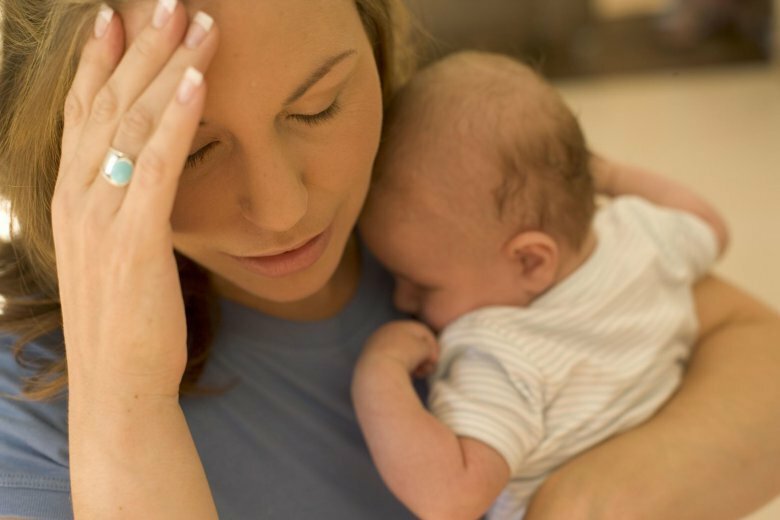 Postpartum depression manifests both physically and emotionally
Postpartum depression manifests both physically and emotionally - depression
- anxiety
- feeling of inner emptiness
- increased irritability
- loss of interest in life
- appearance of a large number of inferiority complexes
- constant sense of guilt
- decreased interest in the child
- feelingbad mother
- tearfulness
- appetite impairment
- memory impairment
- absent-mindedness
- frequent shiftsmood
- sleep disorder
- permanent physical impotence
Why does postpartum depression occur?
IMPORTANT: Cases of postpartum depression were recorded as far back as the 4th century. But in the modern world this violation has become especially widespread.
Doctors continue to study this disease, and if its signs and methods of treatment have been established, then clear reasons for the onset of the disease are still a mystery. Emotional decline after delivery is observed in a variety of women, often not related to each other's past illnesses, or living conditions. Scientists are still looking for a kind of algorithm that leads or does not lead to depression after childbirth.
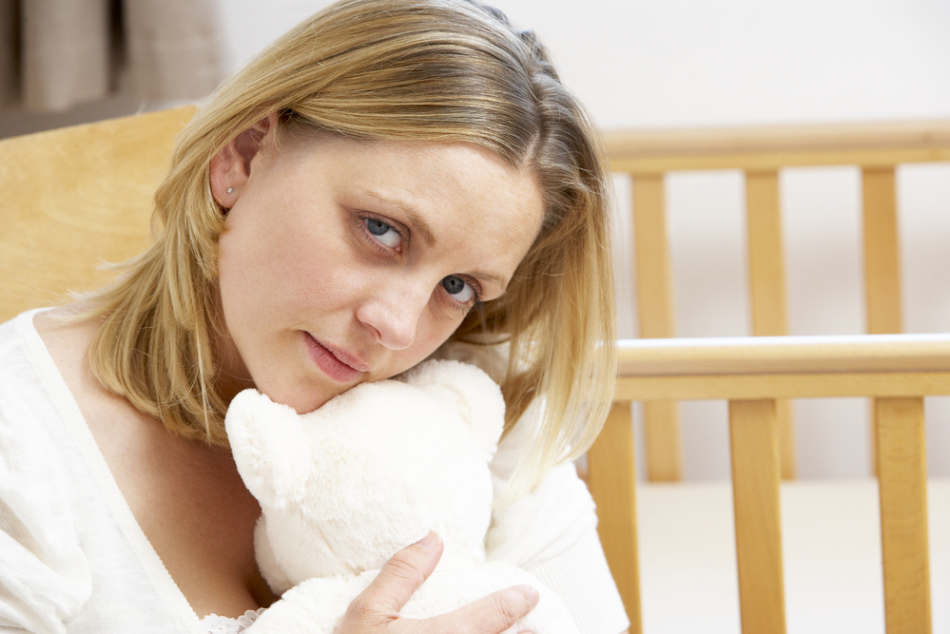 One of the causes of postpartum depression is the difficult situation in the family of the young mother
One of the causes of postpartum depression is the difficult situation in the family of the young mother Among the biological causes of the disease are glitches in the hormonal background and regular physical exhaustion in the first weeks after the birth of the child. They also note psychological grounds, which include a mother's predisposition to emotional disorders, uneasy conditions in a woman's family, her unpreparedness for motherhood, feelings of disappointment.
IMPORTANT: The development of postpartum depression does not depend on the financial situation of the mother and her family. There are cases of illness in royal families, pop stars and very rich people. From the emotional recession suffered, for example, Princess Diana.
Along with the usual postpartum depression is already called the disease of our time. Physicians are trying to understand why it is in our days such a high percentage of cases. Probably, this is due to the way of life that modern people lead, the researchers concluded. The rhythm of a person's life today is not just quick, but often exhausting.
Over the last century, a dramatic change has occurred in women's lives. Now, in addition to motherhood and home improvement, a woman must realize herself as a person and build a career. Career achievements, aspirations to achieve independence and assert themselves complicate the receipt of sincere joy from the birth of the baby.
 A modern woman is often at a crossroads: starting a child or realizing herself
A modern woman is often at a crossroads: starting a child or realizing herself With the advent of a child, a woman has to fundamentally change her life, to leave in the past everything from which her life consisted. If the maternal instincts do not block the pain of loss, fertile ground for the development of depression arises.
IMPORTANT: Postpartum depression is a common occurrence after miscarriage or the birth of a dead child.
How to recognize postpartum depression?
To begin with, it should be noted that postpartum depression is not an ordinary spleen, but a serious mental disorder. Khandra lasts several days or weeks, can be accompanied by similar symptoms - tearfulness, physical fatigue, mood swings, insomnia, eating disorders, etc. But with all these unpleasant manifestations, you do not leave a feeling of happiness from the birth of a child and the joy of life in general. You do not want to throw everything and run away or drop your hands, turn to the wall and do nothing.
IMPORTANT: Only 3% of women who develop depression after childbirth are diagnosed with this disease. Be attentive to yourself and your friends pregnant women.
 Diagnosis of postpartum depression is hampered by the fact that a woman does not want to admit the problem of
Diagnosis of postpartum depression is hampered by the fact that a woman does not want to admit the problem of Often, the postnatal decline begins to manifest itself during pregnancy - at the very last stage, when the child is about to appear. The woman becomes passive, detached, she has a feeling that she is unable to control the situation. The same symptoms may have a natural anxiety, but still it is worth worrying about such a condition and tracing its change in the future.
Almost every person has the image of a young mother. This is a happy, smiling, beautiful woman who presses to her chest and kisses a clean, pink-cheeked baby. Nearby, as a rule, happy spouse. These are the most joyful people in the world, and it is outwardly unlike that they are expected ahead of the difficulties.
The birth of a child is always a serious change, a lot of worries, pleasant and not very stressful. Do not identify yourself with this picture in your head, in reality everything will be wrong. Of course, you will be happy with your spouse and your child, but it is the comparison of yourself, tired, tear-stained, disheveled, with a fictitious image of a happy mother that often causes postpartum depression.
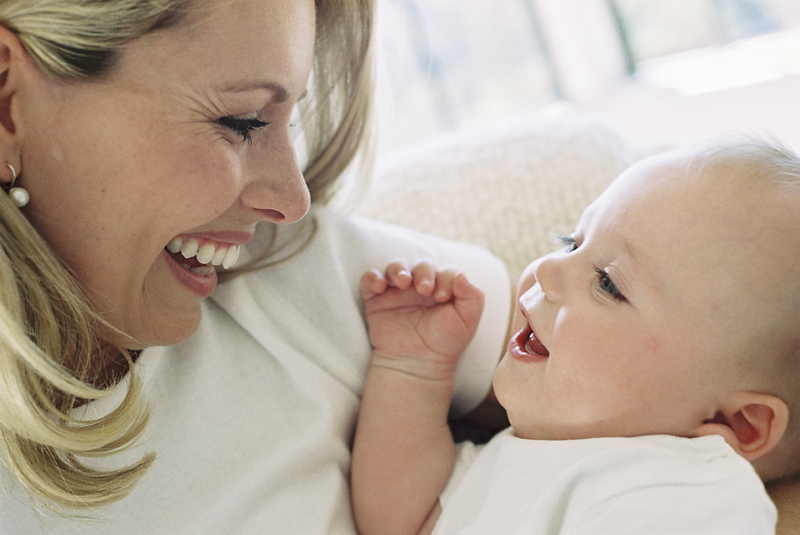 A child in the family is not only a miracle, but also a great responsibility
A child in the family is not only a miracle, but also a great responsibility To diagnose a disease in your body, you need to be sensitive to yourself. Multiple problems that fall on you with the birth of a baby, can get you rancid, make you irritable and tired, break your sleep and appetite.
But if you experience depression, loss of interest in life, unwillingness to spend time with a child and, in some cases, hate for him, be sure to report your condition to your husband or relatives. If you are not heard, go to the doctor. Today, postpartum depression is a fairly common disease, and the doctor will help you cope with it with advice and medication.
IMPORTANT: The vast majority of women are afraid to admit that they have discovered the symptoms of the disease. They consider themselves to be a bad mother and have a strong sense of guilt.
How long does postpartum depression usually last?
The first symptoms of postpartum depression may appear even during pregnancy. This is physical and mental depression, unwillingness to control the process. Many women develop blues after childbirth, but it quickly passes. After a few days or weeks of depression, real depression may occur. It can appear even several months after the birth of the child.
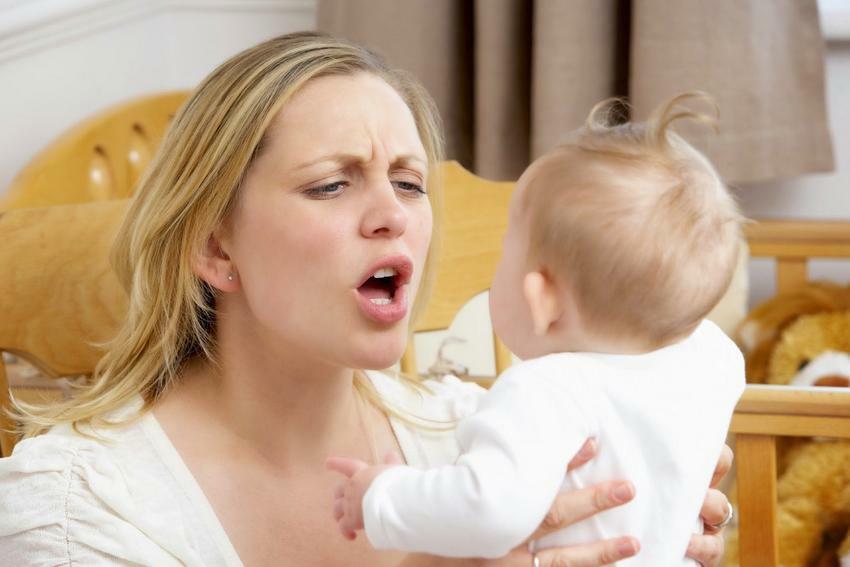 Postpartum depression can last for years
Postpartum depression can last for years If the emotional downturn is treated, it passes pretty quickly, the account goes for weeks or 1-2 months. If the disease is started, then it flows into a severe form and can last for years. It is not uncommon for a child to grow up and go to a kindergarten, and his mother still can not cope with postpartum symptoms. A woman lives in hell, because she has to realize that she does not love her already grown child.
Stages of postpartum depression
Postpartum depression can occur in both mild and severe forms. There are several stages of the disease:
- Handra is a condition in which most of the symptoms of depression manifest, but you are not left with a sense of happiness about the birth of a child.
- The initial stage of depression is the exacerbation of the symptoms of the disease
- Deep depression. With a protracted violation, it may seem that the symptoms are fading. In fact, this is due to a change in your attitude towards depression and the attitude of your loved ones towards it. You get used to your condition and learn to put up with it, but the disease does not go away
 Prolonged depression is dangerous not only for the mother, but for the child
Prolonged depression is dangerous not only for the mother, but for the child How to get out of postpartum depression yourself?
IMPORTANT: Only a qualified doctor can help to get out of depression completely. Independently, you can only fight with blues or the mildest stage of the disease.
Here are some tips on how you can defeat the post-natal emotional decline yourself:
- Eat well. If you have no appetite or, on the contrary, you are experiencing excessive hunger, make up a special regime for yourself. Eat often and in small portions, at least 5-6 times a day.
- . Load yourself physically. Of course, this should be a reasonable motor activity taking into account your weakened after delivery condition. As a therapy, experts recommend a daily 30-minute fast walking.
- Learn to rest. It is not necessary to carry out the entire care of the child herself. Transfer some of the responsibilities to your husband and other loved ones. Quality rest and especially sleep will help to significantly improve your state.
- Be open with your partner and loved ones. Share your concerns with them, tell them everything that concerns you about the child and yourself as a mother. Supporting family and friends will help you not to be alone with your fears.
- . Get in touch with other people, do not shut yourself up. Lack of communication will only exacerbate the symptoms of
- Find on the Internet or your city a support group for women who gave birth. Communication with the same mothers as you will become the necessary support for you on this difficult path to combat depression.
- And the most important point, of course, is a doctor's appointment. Realize the seriousness of your condition, understand that it will be very difficult for you to cope with the disease, and go to a certified therapist
 . Healthy sleep will help to cope with stress.
. Healthy sleep will help to cope with stress. . How to behave in case of prolonged postpartum depression?
IMPORTANT: Any form of mother depression affects the child negatively, because the woman and the baby do not get emotional contact, which is necessary for the child to feel safe and develop properly.
 The alienated mother grows the same alienated child
The alienated mother grows the same alienated child A prolonged depression is dangerous because from year to year a woman is not able to take care of a child and bring him up properly. When a young mother constantly struggles within herself, she, naturally, can not give anything to others, including her baby.
Here are some of the effects that children have on their mother's depression. Child:
- becomes alarming
- can not properly and naturally express its feelings
- can not show its positive emotions
- does not express interest in the world
- is alienated from its relatives and especially from its mother
- does not contact people
And this is only a short listdisorders in the emotional sphere that await the baby with a depressed mother.
Prolonged depression is characterized by the fact that the symptoms of the disease are smoothed out. The environment may even seem that you have no depression. Do not get used to your condition and learn to live with it. As soon as possible, visit a doctor and talk to him about your frustration.
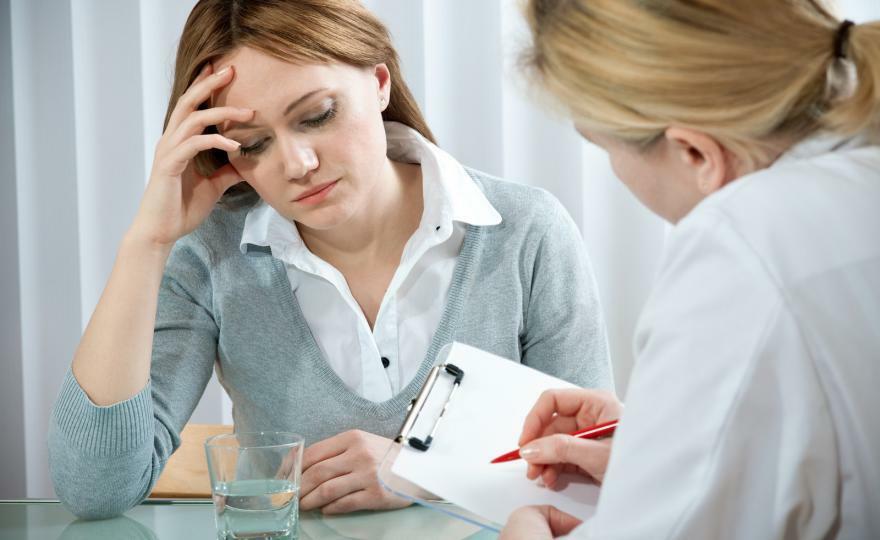 Visit to the doctor - the best solution for postpartum depression
Visit to the doctor - the best solution for postpartum depression How to avoid postpartum depression?
To begin with, you need to exclude a hereditary factor. Before or during pregnancy, find out whether there have been any cases of such a violation in your family and husband's family.
Make an appointment for a preliminary consultation with a psychotherapist. Having talked with you, the doctor will determine those factors that can play a determining role in the development of the disease, and help you to leave the risk zone.
Listen to any changes that are happening to you. Be aware of a change in your mood, think about whether you have any inferiority complexes, do not you feel guilty about something. At the first signals, report your condition close or directly to the doctor.
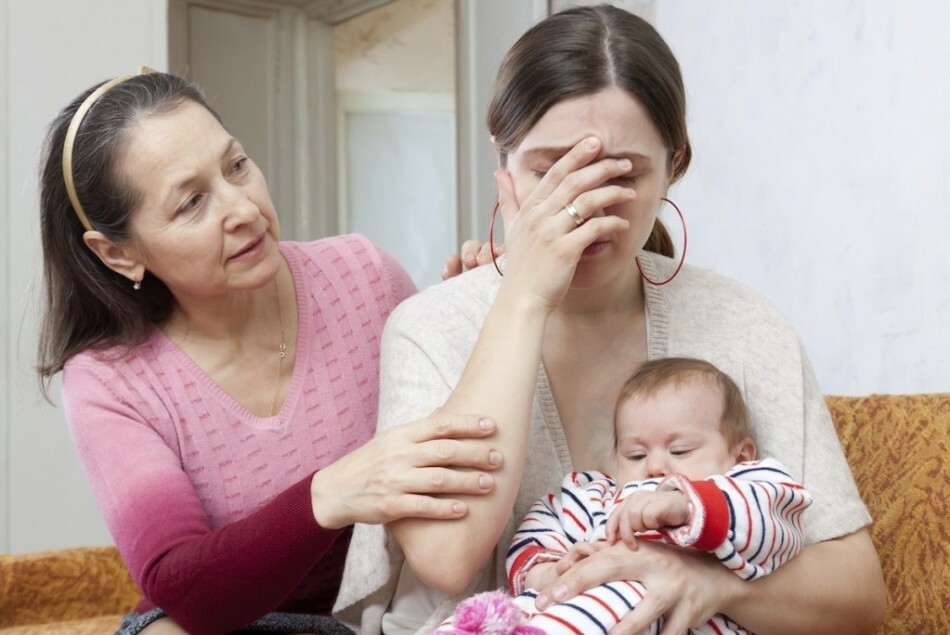 Support for loved ones - a pledge to improve your condition
Support for loved ones - a pledge to improve your condition Will people's remedies survive independently postpartum depression?
The following medicinal plants will help to survive the depressed state.
St. John's Wort. Fill with 2 tsp.dry St. John's wort with a glass of boiling water, leave to infuse for 10 minutes, after which drink the entire volume. For each reception, brew a fresh portion of tea. Drink infusion 3 times a day. The course of treatment is 2-3 months, depending on how your condition will improve.
IMPORTANT: St. John's wort should not be used with antidepressants.
 St. John's Wort
St. John's Wort Schisandra Chinese .In a dark glass container with a lid, pour 20 g of dried and pounded berries with half a glass of alcohol. In a dark place, infuse liquid for 10 days, shaking daily. After 10 days, drain the liquid and squeeze juice from the berries into it. After another 3 days, run the liquid through a gauze or a fine sieve. The resulting solution should be taken 2 times a day for 20 drops. In a particularly acute condition, it is allowed to increase the dose to 40 drops.
 Schisandra Chinese
Schisandra Chinese Passionflower( Passiflora) .Pour 1 tsp.herbs boiling water in a volume of 150 ml. Allow the liquid to infuse for 10 minutes, then pass through a fine sieve and drink. It is best to take passionflower at night for 20-60 drops, depending on your emotional state.
 Passionflower( passionflower) perfectly removes anxiety
Passionflower( passionflower) perfectly removes anxiety How to get out of postpartum depression alone: advice and feedback
Here are some more tips on how to recognize postpartum depression. If you answered "yes" in the majority of cases to the following questions, then you should immediately call your doctor for help.
- Did the postpartum spleen, accompanied by mood changes, sleep and appetite disturbance, fatigue, after 2 weeks
- Do you feel that your condition does not improve and every day it gets harder
- Is it hard for you to take care of your baby? You do not feel the joy of communicating with the child
- Is it difficult for you to complete any, even small daily tasks
- Do you have thoughts about harming yourself or your child
